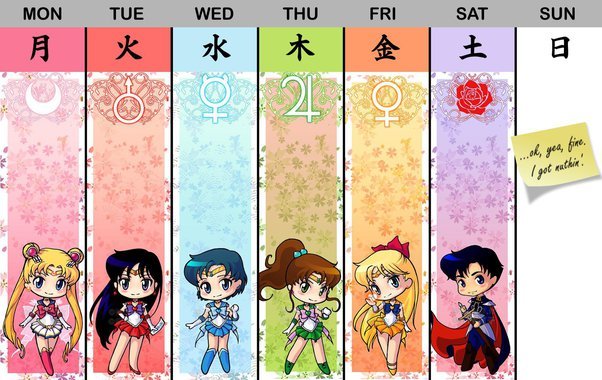How to say the days of the week in Japanese
How to say the days of the week in Japanese
Estimated reading time: 5 minutes
To discuss your flight schedule and travel arrangements with others when you are in Japan, you may find it helpful to become familiar with the days of the week, or youbi, in Japanese. Learning the days of the week in Japanese is probably one of the first things you will study as a Japanese learner, even if you are not planning a trip there anytime soon.
Because every day in Japanese ends with the same suffix, learning the days of the week might be easy for English speakers. In English, it’s -day; in Japanese, every weekend day is -youbi. Remember this suffix, and you’ll have already made half the progress.
| English | Kanji | Hiragana | Romaji |
| Sunday | ÌËÌÌË | ШÐÀÐÐа | Nichiyoubi |
| Monday | ÌÌÌË | ÐÐÊÐÐа | Getsuyoubi |
| Tuesday | Ó¨ÌÌË | ÐÐÐа | Kayoubi |
| Wednesday | ̯ÇÌÌË | ÐÐÐÐа | Suiyoubi |
| Thursday | Ì´ÌÌË | ÐÐÐÐа | Mokuyoubi |
| Friday | ÕÌÌË | ÐÐÐÐа | Kinyoubi |
| Saturday | ÍÌÌË | ÐˋÐÐа | Doyoubi |

If you’ve determined why you want to study Japanese and have a specific objective in mind. Register yourself on italki.com. From the beginning, the italki Japanese teachers will assist you with all three Japanese writing systems. You may quickly become a fluent Japanese speaker with italki. Go to the website and choose the tutor of your choice.
How to remember the days of the week in Japanese
If you are just starting out with Japanese, these words may appear intimidating, especially since they are all kanji. The kanji for (-youbi) in particular can be difficult to write by hand, so you might want to start by writing only the first kanji, then -youbi in hiragana.
However, there is a simple memory trick that Japanese students use for the first character of each day of the week. Each day of the week has a natural element that corresponds to its kanji character, and Japanese schools use these mnemonics to help grade students learn the kanji early on. Letãs dissect them together.
Sunday in Nichiyoubi
ÌË (nichi) literally translates to “day” or “sun” in kanji. For English speakers in particular, this makes it simple to recall the first day of the week in Japanese. Think of the kanji character for “sun” as a window that lets you observe the sun rising on a Sunday.
Monday is Getsuyoubi.
The meaning of Ì (getsu) in kanji is “month” or “moon.” Just as the moon rises after the sun sets, so too does Monday rise after a Sunday evening.
Tuesday, Kayoubi
Ó¨ (ka) is the kanji for “fire.” You might even imagine the character to be a dancing flame if you put some creativity into it. If you find it difficult to visualize the fire, consider Tuesday as the day you wake up for the week following a depressing Monday.
Wednesday is Suiyoubi.
“Water” is what the kanji ̯ (sui) implies. Wednesday might be compared as a refreshing splash after a scorching Tuesday. If you’re still having trouble remembering the phrase suiyoubi, try visualizing Wednesday as the high point of the week.
Thursday is Mokuyoubi.
Moku, written in kanji, means “wood” or “tree.” Ì¥´ resembles a naked tree with branches extending both above and below its massive trunk.
Friday is Kinyoubi.
Everyone eagerly awaits Friday. The excitement of the weekend is almost here. That may be the reason that Kinyoubi’s first character, Õ, is the kanji for “gold” or “money.” You can reflect back on this day by picturing how much money you’ll spend this Friday night after work or by declaring that Friday is your favorite day of the week.
Doyoubi on a Saturday.
Saturday’s first kanji character is ÍÂ (do), which translates to “earth” or “soil.” To help you recall this, think about soothing hobbies that individuals love on their days off, like gardening. Alternatively, you may take the word “earth” literally and envision yourself exploring the universe of potential delights on Saturday.
The process of learning Japanese is not hard. You must hone your creativity, be dependable, and select the appropriate learning materials.
Other Japanese words related to days and dates
| Kanji | Reading | Meaning |
| ð£ÌËÐÐÐ | kyou | today |
| Ì´ÌËÐÐÛÐ | kinou | yesterday |
| ð¡Ì´ÌËÐддР| ototoi | the day before yesterday |
| ÌÌËÐÐÐ | ashita | tomorrow |
| Ì̓ÌËÐÐÐÈÐÎ | asatte | the day after tomorrow |
| ð¡ÌËÐÐÀШÐÀ | ichinichi | all day long |
| ÕÝÐÐ Ð | shuu | week |
| ð£ÕÝÐÐÐÐ Ð | konshuu | this week |
| Í ÕÝÐÐÐÐ Ð | senshuu | last week |
| ÌËÕÝÐÐÐÐ Ð | raishuu | next week |
| ÌÐÐÊ | getsu | month |
| ð£ÌÐÐÐÐÊ | kongetsu | this month |
| Í ÌÐÐÐÐÊ | sengetsu | last month |
| ÌËÌÐÐÐÐÊ | raigetsu | next month |
| Í¿ÇÐÙÐ | nen | year |
| ð£Í¿ÇÐдР| kotoshi | this year |
| ͣͿÇÐÐÐÙÐ | kyonen | last year |
| ÌËÍ¿ÇÐÐÐÙÐ | rainen | next year |
You may notice some patterns in some of these words: the kanji ð£ (read ko- or kon-) refers to the present time, while ÌË (read as rai-) refers to the future. This isnãt always the case, but itãs a good tip to keep in mind when reading a Japanese schedule or calendar.
Some Japanese examples related to the days of the week
- Tuesdayãs lunch is always spaghetti. Ó¨ÌÌËÐÛÐˋаÐÐ₤ÐЈÐÐÐпТÐÏÐ. Kayoubi no ranchi wa kanarazu pasta desu.
- I have a test on Friday. ÕÌÌËШÒˋÎÕ´ÐÐÐЃÐ. Kinyoubi ni shaken ga arimasu.
- Tomorrow is my birthday. ÌÌËÐÓÏÐÛÒˆÓÌËÐÏÐ. Ashita ga watashi no tanjoubi desu.
- Weãre going to my auntãs house next week. ÌËÕÝ, ÐÐÀÐÛÐЯÐÐÐÛÍÛÑШÒÀÐЃÐ. Raishuu, uchi no obsa-san no ie ni ikimasu.
- I have a date on Monday. ÌÌÌËШÐÐ¥ÐÐÐÐЃÐ. Getsuyoubi ni deeto ga arimasu.
Learn Languages Store
Vashi,
Email: services@learnlanguages.store










